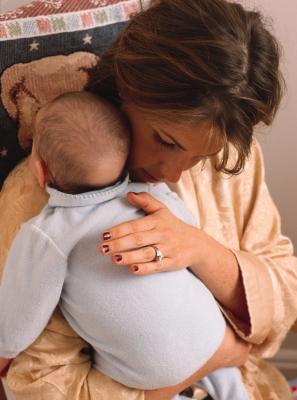Almost as soon as your baby is born, it can seem as though everyone around you is badgering about how much your baby is sleeping and how much sleep you’re getting as a result. Babies need a lot of sleep — as much as 16 hours a day — but it occurs in short bursts. This can disrupt your own sleep, but you can help your baby to develop good sleeping habits.
Normal Sleep Habits
During the first few months of a baby’s life, he’ll need to eat every three hours — at least. He may go through phases of waking, sleeping and eating, but none of these phases lasts too long. Around 3 to 6 months of age, your child will probably start sleeping for longer periods at night and taking two naps during the daytime, about one or two hours each. At 1 year, most children start to switch to taking one afternoon nap and sleeping through the night.
The Baby Sleep Cycle
It can take a baby about 20 or 30 minutes to fall into deep sleep, whether she looks like she’s sleeping or not. Some parents make the mistake of trying to place a “sleeping” baby into a crib while she is not yet in deep sleep, causing her to wake up. If this happens with your baby, try waiting an additional 20 minutes after you think that she’s sleeping before you place her in her crib.
Sleeping Through the Night
Getting a baby to sleep through the night is a common goal for new parents. After all, if the baby is sleeping through the night, then parents can sleep through the night, too. The term is a bit confusing, though. As an adult, you may think of a good night’s sleep as eight hours of sleep. A baby, however, will only be able to sleep for about five hours straight, without needing to wake up for a feeding. If you want to get a good stretch of sleep yourself, wake your baby up for a feeding just before you want to go to bed.
Developing Healthy Sleep Habits
Ideally, you may want your baby to fall asleep on her own. To do this, you’ll need to watch her for signs of sleepiness, such as eye rubbing or crankiness, and then place her in her crib while she is still awake, but sleepy. She may then learn to put herself asleep. Teach her the difference between daytime and nighttime by being more active during the day than at night. When she wakes up at night, quietly take care of her needs — feed her, change her diaper and offer some comfort — but don’t turn the light on and don’t play with her. Though it can be tempting to keep your child awake during the daytime so that she’ll sleep better later at night, this is usually not a good idea. Babies who are overtired will have a more difficult time falling asleep.
Variations Among Babies
All babies are different and have different sleep habits. Some babies will sleep well on their own, while others may need more comfort. Try to accept your baby as he is, rather than trying to fit him into the mold of another mother’s baby. You may also find that your baby sleeps better in a swing or a sling instead of his crib. This is normal.





